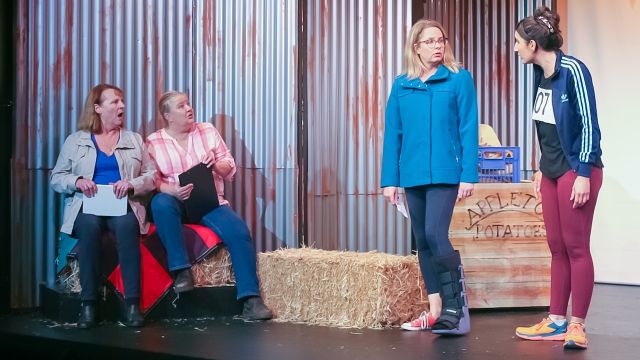The Appleton Ladies’ Potato Race
Tea Tree Players are known for their farces, so this year is an experiment to gauge audience reaction to other forms of theatre. Their first production was a fruity melodrama, now The Appleton Ladies’ Potato Race, a comedy with messages of equality and inclusivity. Later this year they will present the landmark Australian play Cosi, finishing up the year with A Vicar of Dibley Christmas - The Second Coming (plus a Youth Theatre production and a pantomime). The general public are certainly getting more than their money’s worth!
The play is set in the small (fictional) country town of Appleton in the Southern Highlands of NSW, where the annual show includes carrying large sacks of potatoes round a racetrack. The winner of the men’s race gets $1000, while the winner of the women’s race wins a paltry $200. New doctor and returning resident Penny Anderson sees this as completely unfair and sets out to right the wrong.

Playwright Melanie Tait takes real-life events and brings us a warm comedy showing the world that there’s more than one way to win a race. It is a look at the way country life has been affected by the 21st century and how it responds to the influx of sexual preferences, immigrant influences on food and attitudes and the adaptation of traditional values to modern ideals. Sounds heavy, but it is anything but that.
Director Selena Carr (together with Samuel Creighton) has designed an ingenious set with an open area that serves multiple scenes and side stages that open and close to reveal a hairdressing salon and a doctor’s surgery. The set is lined with corrugated iron with a scrim across the back that is used for back projection.

Carr wisely focusses on the humanity of the play and brings to life five very believable women who trigger ‘aha’ moments with the audience. Personally, I could see elements of my mother, aunt, and grandmother in these very different personalities.
It is a busy show with many scenes, voice overs, and lighting states. Thanks to props (Beth Venning), lighting and sound (Zack Brittan and Mike Phillips) and a busy stage manager (Tom Moore), the production runs without a hitch.
Sonja Lawrance gives Penny Anderson, the doctor returned to the country to start a medical practice, gravitas, and heart. She is the linchpin of the play and drives the pace and storyline. Her scene with Bev Armstrong is moving.

Heather Riley is tradition personified on the surface, but with the veneer scraped off, she is a vulnerable woman with her own cross to bear. As mentioned above, the doctor’s office scene is a highlight.
Chris Galipo’s Barb Ling is a woman with a secret which I will not reveal here. The secret she has been hiding ties up the loose ends of the play nicely. Her monologue with the washing basket in act two is an emotional glimpse into her mind.

Hayley Mitchell plays the ‘loud’ Nikki Armstrong to perfection. It would be easy to caricature this role, Mitchell plays her to the hilt without ever overstepping. Her dance routine at the start of act two is wonderful.
Kahlia Feuerreiter stepped into the role of Rania Hamid ten days before the opening night. Not that you would know. Her accent is perfect. Her balancing act in desiring acceptance, integration and sharing of cultures, whilst also standing up for what she believes in and experiencing both outright and casual racism, is much too familiar with many Australian migrants’ stories and is handled sensitively.

The Appleton Ladies’ Potato Race carries an important message but presents it using humour making it far more palatable. Go and see it. You will be highly entertained and come home with more than a few questions to ponder.
Barry Hill OAM
Buy your copy of The Appleton Ladies’ Potato Race a Book Nook. Click here.
Subscribe to our E-Newsletter, buy our latest print edition or find a Performing Arts book at Book Nook.

